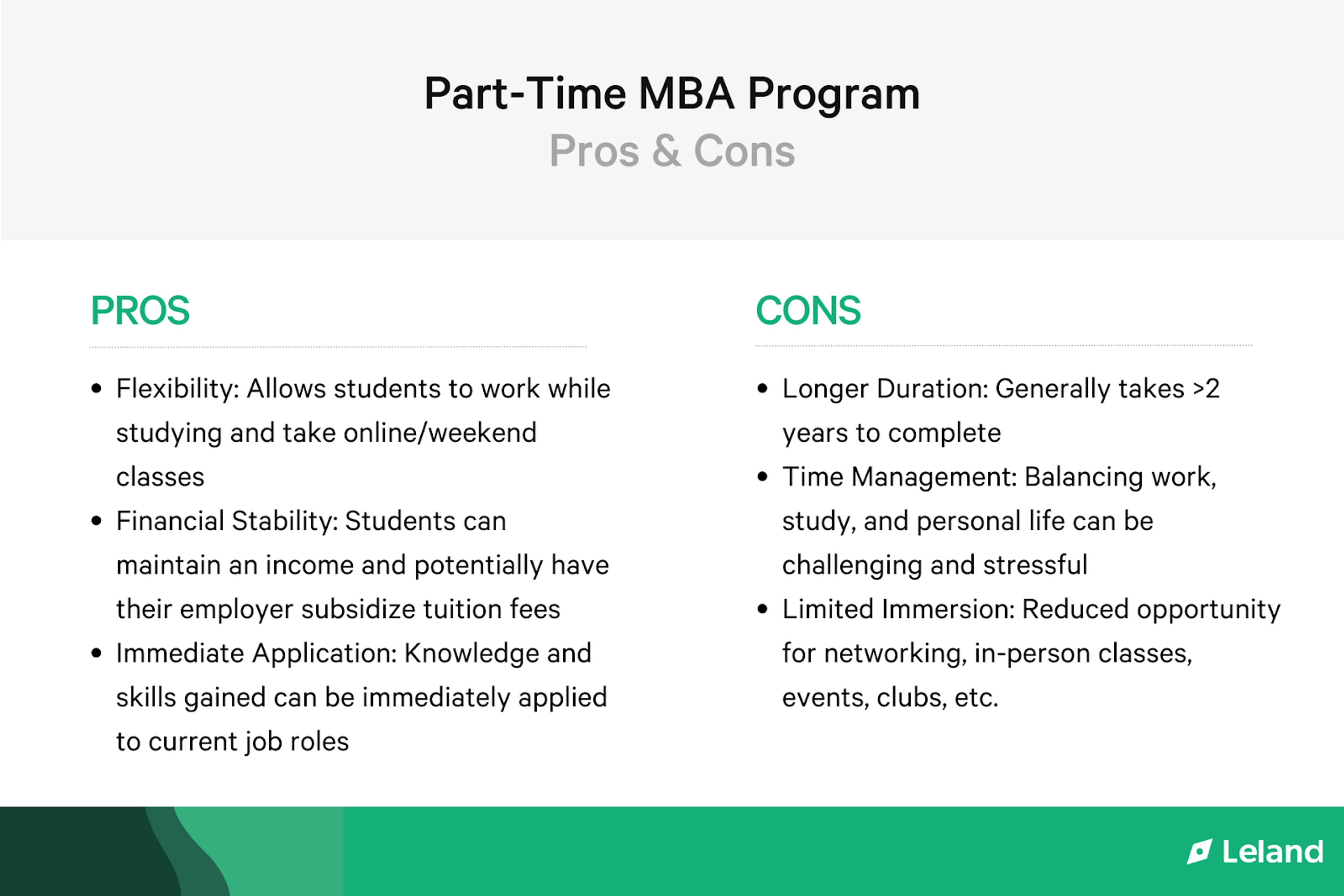
Table of Contents
Choosing between a part-time and full-time MBA program can significantly impact your career trajectory, lifestyle, and educational experience. In today's competitive business world, earning a Master of Business Administration (MBA) degree has become a strategic step for professionals aiming to enhance their career prospects, expand their professional network, and gain a deeper understanding of business management principles.
However, with various options available, deciding whether to pursue part-time or full-time MBA programs requires careful consideration of several factors, including time commitment, financial investment, career goals, and personal circumstances, among others. In this article, we'll look at both programs' pros and cons, walk you through how to decide which one is right for you, and provide a list of the best part-time MBA programs for your consideration.
For those who are new to the MBA journey, it's essential to understand the fundamentals of what an MBA degree entails. If you're curious about what an MBA degree is and how it can benefit your career, check out our comprehensive guide on What is an MBA Degree?
Additionally, understanding the different types of MBA degrees available can provide valuable insights into which program aligns best with your career goals and aspirations. Learn more about the various types of MBA degrees in our detailed exploration of The Different Types of MBA Degrees.
Full-Time vs. Part-Time MBA Program: What’s the Difference?
The biggest difference between these two programs is in the name: One is full-time, meaning it is fully immersive and requires at least a 40-hour time commitment (meaning candidates must leave their full-time jobs), while the other is part-time and can be completed in congruence with a job. Outside of this very basic distinction, there are several other important differences to be aware of:
- The courses for part-time programs are typically taken on weekends or in the evenings. Different programs have different formats, so make sure to look into the details of the ones you’re interested in.
- Because of their nature, part-time programs can take longer than the traditional two-year programs.
- There are two main types of part-time MBA programs: the “traditional” part-time MBA, for applicants with several years of work experience, and executive MBA programs, for experienced business professionals with 10+ years of experience. Full-time MBAs, on the other hand, typically only include the former group.
- As we’ll get into below, because of the nature of both programs, full-time MBAs allow for some experiences that part-time MBAs cannot, including time for summer internships, tons of networking, international trips, and heavy recruiting support, among others.
- There is a slight variation in the cost of each of these programs. It depends on the school but generally, part-time programs are a little cheaper and that is further offset by being able to keep a full-time job throughout the program.
- Some part-time programs only have online classes, whereas almost every full-time program (and definitely the top business schools) is only offered in person.
- The class profiles of these programs tend to look a little differently because they are catering to different demographics – in particular, part-time MBA candidates are usually a little older. These are generally the people who have families, are well into their careers, or have other personal circumstances that prevent them from taking a two-year pause.
Pros of a Part-Time MBA Program
Now that we’ve covered what makes these two programs different, let’s go into the pros and cons. As a caveat, what is actually a “pro” or a “con” is dependent on what you are looking for with your MBA. These are a great starting point, but make sure to view them through the frame of your personal circumstances and aspirations.
1. They’re more flexible.
Many potential applicants do not have the ability (or do not want) to give up a full-time job, or the time required to be a full-time MBA student. Part-time programs allow candidates to earn their MBA degrees while maintaining other responsibilities.
Some schools even offer part-time MBA programs for people who do not live nearby. For example, Chicago Booth has a Weekend MBA Program that allows candidates to fly in for their business courses on the weekends, and return to their jobs during the week.
2. They’re (usually) more affordable.
Part-time MBA programs are often cheaper than full-time programs, though both are definitely investments. Part-time students also can use part of their salary to pay, and generally have more financing options available to them.
Not all part-time MBA programs are cheaper, though, so make sure to check the specifics of the ones you’re interested in.
As an example, the full-time cost (tuition, fees, living expenses, etc.) for UC Berkeley Haas is $111,786 per year for California residents, and $124,041 for out-of-state applicants. This comes to $223,572 total for in-state and $248,082 for out-of-state. In comparison, the estimated cost for part-time students (the “Flex Program”) is $148,386. The part-time program, then, is quite a bit more affordable, though you’ll have to take current living expenses into consideration.
On the other hand, the full-time program’s total tuition at Chicago Booth is $161,922 and that comes with 2200 credits, 2000 of which are required for graduation. The part-time program’s tuition is $8,096 per 100-credit course. So for the 2000 required, it would be almost the exact same cost for the part-time program at $161,920. With the full-time program, however, you get 200 extra credits bundled into that, which are worth $16,192.
3. They don’t require you to move.
As mentioned, many part-time MBA programs offer flex or weekend options where their students do not necessarily have to live in the same area as the university. They can travel to the campus on a weekly or monthly basis to take classes, removing the difficulty of moving for a degree. For MBA candidates with families, this is especially beneficial. As mentioned, there are also some programs that are completely remote (and even offer online, asynchronous courses). There are many different kinds of options available depending on what your personal circumstances require.
4. You don’t need to recruit.
Part-time MBA students usually do not need to go looking for employment after graduating because they never left their initial employer. This relieves the stress of job hunting and improves promotion opportunities within the company.
It is a double-edged sword, however, as having the break of the MBA program can provide unique opportunities for career advancement and/or career pivoting. Oftentimes, it’s easier to get a substantial pay increase coming out of an MBA program at a new company versus an old one that might give a raise for a new degree, but only one that makes sense within your current role.
Cons of a Part-Time MBA Program
1. There is less regular academic involvement.
Since part-time classes are held on a weekly, or even monthly, basis, there is generally less time for students to interact with teachers and classmates regularly. With online or sporadic classes, it is more difficult to build these relationships. Full-time students will have more time in the classroom working on group projects, case studies, and other academic endeavors designed to prepare them for real, complex business problems.
2. There are activities you won’t have time for.
As part-time MBA programs are held either off-campus or during a limited schedule, students tend to not be able to participate in all of the activities available to full-time students. This can include class trips, study abroads, club involvement, summer internships, networking, and recruiting events, among others.
3. Balancing work with an MBA program can be stressful.
Due to the nature of the program, part-time students may have to juggle both studying and working and this can lead to additional stress, which has the potential to affect mental and physical health. Potential applicants should make sure they are in a position to balance multiple intensive commitments to protect their well-being. Know yourself, and what you want.

How to Decide if a Part-Time MBA Program is Right for You
To decide whether a part-time or full-time MBA program is the right fit for you, we recommend conducting a thorough assessment of your current situation, career objectives, and personal preferences. Both paths offer unique advantages and pose certain limitations.
Here are some factors to consider. Note, an MBA admissions coach can also be incredibly helpful in supporting you in this decision.
1. Career Goals and Current Employment Status
- Full-time MBA: Ideal for individuals seeking a significant career change, requiring internships, or aiming for industries that traditionally recruit from full-time programs. It's also suited for those who can afford to leave the workforce for the duration of their studies.
- Part-time MBA: Best for those who wish to continue working while studying, allowing them to apply new skills in real-time and maintain a steady income. It can be a great option for professionals aiming to advance to leadership positions within their current field or company.
2. Time Commitment
- Full-time MBA: Demands a significant time commitment, often requiring students to forgo full-time employment. Programs typically last 1-2 years, with a rigorous schedule of classes, networking events, and internships.
- Part-time MBA: Offers greater flexibility, with classes held during evenings or weekends, allowing students to balance work and personal commitments. Programs can take longer to complete, ranging from 2 to 5 years, depending on the course load.
3. Financial Considerations
- Full-time MBA: Requires a substantial financial investment upfront and the opportunity cost of lost wages. However, scholarships, grants, and student loans are often available as well as other financial aid options.
- Part-time MBA: While still a significant investment, allows students to continue earning an income, potentially receiving employer sponsorship or tuition reimbursement programs. Unlike full-time students, part-time candidates will also keep their salary throughout their time in the program.
4. Networking and Learning Environment
- Full-time MBA: Full-time students have extensive networking opportunities and access to campus resources, clubs, events, recruiting support, extracurricular activities, and more. It fosters a collaborative learning environment with a cohort of peers. In-person courses also tend to be more of an experiential learning experience, rather than purely instructional.
- Part-time MBA: Provides networking opportunities tailored to working professionals, though they may be less immersive due to the part-time nature. Classes may offer a diverse mix of professionals bringing in real-world experience. Due to the location flexibility, some part-time programs can be even more diverse and international than their full-time counterparts.
5. Personal Circumstances
Consider personal factors such as family commitments, willingness to relocate, and your learning style. Full-time programs may offer a more immersive experience but require more significant personal sacrifices. Part-time programs offer flexibility but require effective time management skills in balancing school work, study, and personal life.
Making the Decision
Reflect on these different factors; speak with alumni, career counselors, and admissions representatives to gain insights; and attend information sessions or virtual webinars to get a clear picture of what each offers. Here are some questions we recommend asking yourself when trying to figure out which type is best for you:
- What are my career goals? Am I looking to advance in my current field, switch careers, or start my own business?
- How much work experience do I have? Do I have the depth of work experience that would allow me to contribute to and benefit from a part-time program?
- What is my current life situation? Do I have personal commitments (like family or health issues) that would make a full-time program challenging?
- How flexible is my current job? Can my job accommodate the schedule of a part-time MBA? Will my employer support my studies?
- What is my financial situation? Can I afford to stop working and pursue a full-time MBA, or would a part-time program be more financially feasible?
- How quickly do I want to complete the program? Am I in a hurry to complete my MBA, or is a slower pace more suitable for my situation?
- What kind of network am I looking to build? Am I looking for a broad network across various industries or a deeper network within my current profession?
- What learning style suits me best? Do I prefer the intensive study of a full-time program or the flexibility to apply learning directly to my current job as in a part-time program?
- How important is the campus experience to me? Do I value the traditional college experience with more opportunities for campus involvement, which is more typical of full-time programs?
- What are the long-term financial implications? How do the costs, potential salary increase, and career progression compare between part-time and full-time options?
- Am I ready for a major life change? Is this the right time in my life for a significant commitment like full-time MBA programs?
- How do different programs’ reputations align with my career goals? Do the part-time or full-time programs I’m considering have strengths in the areas I’m interested in?
Ultimately, the choice between a part-time and full-time MBA program hinges on your career goals, lifestyle preferences, and financial situation. Both paths can lead to enhanced career opportunities and personal growth; the key is to select the one that aligns most closely with your individual needs and objectives. At the end of the day, you end up with the same degree, no matter the road you choose to take.
The Best Part-Time MBA Programs
Whether you’re looking for fast-track programs into your next career pivot, an educational background you’re missing, opportunities for career development, or just to go through the program at your own pace, here are some of the best part-time programs. Make sure to do your research, as there are discrepancies in program duration and program structure, as well as the admissions process, academic calendar, and general MBA experience.
- University of Chicago Booth
- UC Berkeley Haas
- Northwestern University Kellogg
- New York University Stern
- UCLA Anderson
- University of Michigan–Ann Arbor Ross
- UT Austin McCombs
- USC Marshall
- Georgetown University McDonough
- Ohio State University Fisher

Coach Recommendations
Applying to any kind of business school and MBA program can be a stressful process. Leland is here to help students at all points of their MBA journey. Our coaches are uniquely positioned to help you succeed in deciding your top schools, applying, and preparing for enrollment. See some of our top coaches for part-time MBAs below and browse all of your options here.
Final Note
Here are a few other articles you may find helpful as you research and apply to MBA programs:
- How to Choose an MBA Program: The Discerning Student's Guide
- A Guide to MBA Financial Aid
- How to Write a Powerful MBA Essay—With Examples
- MBA Requirements: What You Need to Apply (and What Top Programs Really Look For)
- MBA vs. MPA: How to Decide Which One is Right For You
Full-Time vs. Part-Time MBA FAQs
Can part-time students get the same quality education as full-time MBA students?
- Yes, many reputable business schools offer part-time MBA programs that provide the same rigorous curriculum and instruction as their full-time counterparts. They offer the same courses, and part-time students often have access to the same professors and resources as full-time students.
Are online MBA programs considered as valuable as traditional, full-time MBA programs?
- Online MBA programs offered by accredited top business schools are increasingly recognized as valuable alternatives to traditional full-time programs. They offer flexibility for working professionals and often cover the same curriculum with interactive online platforms and real-world applications. However, the way they’re viewed does depend on the field, role, and company you’re in.
How do part-time MBA programs accommodate the schedules of working professionals?
- Part-time MBA programs typically offer evening, online, or weekend classes to accommodate the schedules of working professionals. These flexible options allow students to continue working while pursuing their degree.
What are the advantages of attending a top business school for a part-time MBA program?
- Attending a top b-school for a part-time MBA program offers several advantages, including access to the same faculty, extensive alumni networks, career services, and prestigious brand recognition that can enhance your career path and networking opportunities.
Do part-time programs offer specializations or majors like traditional programs?
- It depends on the specific school but, generally, yes. For example, candidates in the weekend MBA at Booth have 14 concentrations they can choose from, including Business Data Analytics, Healthcare, Entrepreneurship, Marketing Management, and more.
Do companies sponsor part-time candidates?
- It depends on the company, but many do. Employee sponsorships have different setups and structures – some pay directly for the program while others many offer tuition reimbursement. A full-time student will likely have access to similar financial support.












